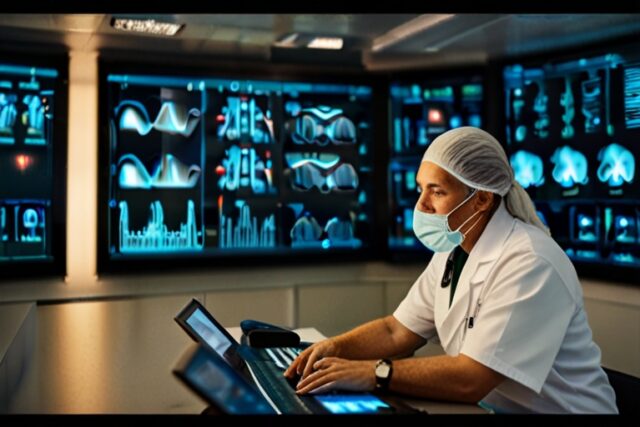In recent years, the proliferation of smart devices has revolutionized how individuals manage their health. These devices, ranging from wearable fitness trackers to sophisticated medical monitoring systems, provide real-time data that empowers users to take control of their well-being. The integration of real-time monitoring with smart devices is not just a technological trend but a significant shift in personal health management. This essay explores how smart devices with real-time monitoring capabilities are improving personal health management, discussing their benefits, challenges, and the future potential of this technology.
The Evolution of Smart Health Devices
Smart health devices have evolved rapidly over the past decade, transitioning from simple step counters to complex systems capable of monitoring a wide range of physiological parameters. The early days of smart health devices were marked by the introduction of fitness trackers, which primarily focused on counting steps, estimating calories burned, and monitoring sleep patterns. These devices quickly gained popularity due to their ease of use and ability to provide users with insights into their daily physical activity.
As technology advanced, smart health devices became more sophisticated, incorporating sensors and algorithms capable of monitoring vital signs such as heart rate, blood pressure, oxygen saturation, and even electrocardiograms (ECGs). This evolution has been driven by advances in sensor technology, miniaturization of electronic components, and the increasing integration of artificial intelligence (AI) and machine learning (ML) algorithms. These developments have transformed smart health devices into powerful tools for real-time health monitoring and management.
Smart Health: Real-Time Monitoring for a Healthier, Happier You.
Benefits of Real-Time Monitoring with Smart Devices
One of the most significant benefits of real-time monitoring with smart devices is the ability to track health metrics continuously. Unlike traditional health assessments, which often occur during scheduled visits to a healthcare provider, smart devices provide users with immediate feedback on their health status. This continuous monitoring allows individuals to identify potential health issues early, take preventive measures, and make informed decisions about their lifestyle and treatment options.
For instance, wearable devices that monitor heart rate variability can alert users to abnormal patterns that may indicate stress, fatigue, or the onset of cardiovascular problems. By receiving real-time alerts, users can take immediate action, such as adjusting their activity levels, practicing stress-reducing techniques, or seeking medical advice. This proactive approach to health management can help prevent the escalation of minor health issues into serious conditions.
Real-time monitoring also plays a crucial role in managing chronic conditions. Individuals with diabetes, for example, can use continuous glucose monitors (CGMs) to track their blood sugar levels throughout the day. These devices provide real-time data that helps users make informed decisions about their diet, exercise, and medication. By maintaining tight control over their blood sugar levels, individuals with diabetes can reduce the risk of complications such as neuropathy, retinopathy, and cardiovascular disease.
Another significant benefit of real-time monitoring is the ability to personalize health management. Smart devices collect vast amounts of data that can be analyzed to identify individual patterns and trends. This data can be used to create personalized health plans that cater to the specific needs and preferences of the user. For example, a fitness tracker can analyze a user’s activity levels, sleep patterns, and heart rate to recommend tailored exercise routines and sleep schedules. This level of personalization enhances the effectiveness of health management strategies and increases the likelihood of long-term adherence to healthy behaviors.
Enhancing Preventive Healthcare
Real-time monitoring with smart devices is also transforming preventive healthcare by enabling early detection of potential health issues. Preventive healthcare focuses on identifying and addressing risk factors before they lead to illness or injury. Smart devices equipped with advanced sensors can detect subtle changes in physiological parameters that may indicate the early stages of a health condition. For example, smartwatches with ECG capabilities can detect irregular heart rhythms, such as atrial fibrillation, which is a known risk factor for stroke. By detecting such irregularities early, users can seek medical intervention before the condition worsens.
Furthermore, smart devices can play a critical role in monitoring at-risk populations, such as older adults or individuals with a history of certain medical conditions. For example, fall detection sensors integrated into wearable devices can automatically alert emergency services or caregivers in the event of a fall, ensuring that the individual receives prompt assistance. Similarly, devices that monitor respiratory function can be invaluable for individuals with chronic respiratory conditions, such as asthma or chronic obstructive pulmonary disease (COPD). By tracking respiratory metrics in real-time, these devices can provide early warnings of exacerbations, allowing for timely intervention.
Empowering Individuals Through Data and Insights
One of the key advantages of real-time monitoring with smart devices is the empowerment of individuals through access to data and insights. In the past, individuals had to rely primarily on healthcare providers to assess their health and provide guidance. While healthcare providers remain essential partners in health management, smart devices give users greater control over their health by providing them with immediate access to their health data.
This access to data fosters a sense of ownership and responsibility for one’s health. Users can track their progress over time, set goals, and make informed decisions based on the insights provided by their devices. For example, a user who is trying to lose weight can monitor their daily calorie expenditure, track their physical activity, and receive feedback on their progress toward their weight loss goals. This immediate feedback loop can motivate users to stay committed to their health goals and make necessary adjustments to their behavior.
Additionally, the data collected by smart devices can be shared with healthcare providers, enabling more informed and collaborative decision-making. For example, a patient with hypertension can share their blood pressure readings with their doctor, allowing the doctor to adjust their treatment plan based on real-time data rather than relying solely on occasional office visits. This collaborative approach enhances the quality of care and ensures that treatment plans are tailored to the patient’s current needs.
Addressing the Challenges of Smart Device Monitoring
While the benefits of real-time monitoring with smart devices are significant, there are also challenges that need to be addressed to ensure the effective use of this technology in personal health management. One of the primary challenges is data accuracy and reliability. The accuracy of smart devices can vary depending on factors such as sensor quality, device placement, and user behavior. Inaccurate data can lead to incorrect assessments and potentially harmful decisions. Therefore, it is essential to ensure that smart devices undergo rigorous testing and validation to meet high standards of accuracy.
Another challenge is the potential for data overload. Smart devices generate large amounts of data, which can be overwhelming for users to interpret and manage. To address this issue, developers of smart health devices must focus on creating user-friendly interfaces and providing actionable insights rather than raw data. AI and machine learning algorithms can play a crucial role in this process by analyzing data in real-time and presenting users with simplified, relevant information that they can easily understand and act upon.
Privacy and security are also critical concerns when it comes to real-time monitoring with smart devices. The data collected by these devices is highly sensitive and personal, making it a target for cyberattacks and data breaches. To protect users’ privacy, it is essential to implement robust security measures, such as encryption and secure data storage. Additionally, users should be informed about how their data is being collected, stored, and used, and they should have control over who has access to their data.
The Future of Real-Time Monitoring in Personal Health Management
The future of real-time monitoring with smart devices in personal health management is promising, with ongoing advancements in technology set to enhance the capabilities and impact of these devices. One area of significant potential is the integration of AI and machine learning into smart health devices. AI-powered algorithms can analyze large datasets, identify patterns, and provide personalized recommendations in real-time. For example, an AI-powered fitness tracker could analyze a user’s activity levels, sleep patterns, and dietary habits to create a customized health plan that maximizes their well-being.
Another exciting development is the potential for smart devices to integrate with other health technologies, such as telemedicine platforms and electronic health records (EHRs). This integration would create a seamless ecosystem where real-time data from smart devices is automatically shared with healthcare providers, enabling more comprehensive and coordinated care. For example, a patient recovering from surgery could use a wearable device to monitor their vital signs, with the data being automatically transmitted to their surgeon for ongoing assessment and adjustments to their recovery plan.
The development of new sensors and wearable technologies is also likely to expand the range of health metrics that can be monitored in real-time. For example, researchers are working on developing non-invasive sensors capable of monitoring blood glucose levels, hydration status, and even biomarkers for specific diseases. These advancements would further enhance the ability of individuals to manage their health proactively and prevent the onset of serious conditions.
Stay Informed, Stay Healthy: Real-Time Insights with Smart Devices.
Conclusion
Real-time monitoring with smart devices is transforming personal health management by providing individuals with continuous access to valuable health data. These devices empower users to take control of their health, make informed decisions, and engage in preventive healthcare practices. The benefits of real-time monitoring are particularly evident in the management of chronic conditions, the early detection of health issues, and the personalization of health plans. However, challenges related to data accuracy, privacy, and data overload must be addressed to ensure the effective use of this technology.
As technology continues to evolve, the future of real-time monitoring with smart devices holds great promise. The integration of AI, the development of new sensors, and the creation of interconnected health ecosystems are likely to further enhance the capabilities of these devices, making them an indispensable tool in personal health management. By harnessing the power of real-time monitoring, individuals can achieve better health outcomes, improve their quality of life, and take a more proactive approach to managing their well-being.






